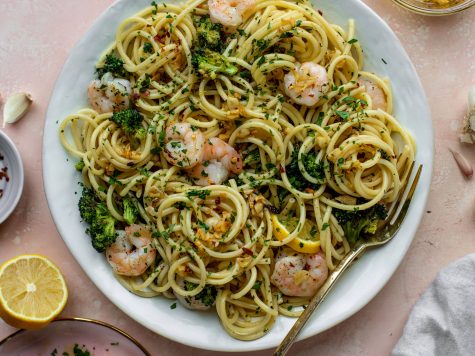Want to try plant your own broccoli crop? Discover the best way to grow broccoli, at GardenersWorld.com.
Nutritional benefits of broccoli
An 80g portion broccoli (boiled) provides:
- 22 kcals/96KJ
- 2.6g protein
- 0.4g fat
- 2.2g carbohydrates
- 2.2g fibre
- 478mcg carotene
- 35mg vitamin C
An 80g portion (about two spears) count as one of your five-a-day. Take a look at our printable infographic to discover what counts as five-a-day.
Top 5 health benefits of broccoli
1. Good for heart health
A study by Nutrition Research found that consuming steamed broccoli regularly lowers the risk of cardiovascular disease by reducing the total amount of cholesterol in the body. Another study in the US also found that increasing vegetables in the diet, especially brassica vegetables like broccoli, may reduce the risk of heart disease.
2. Contains cancer protective compounds
While there are no single ‘superfoods’ that can prevent cancer, and certain risk factors for cancer are unrelated to diet, there is evidence that eating a healthy diet can reduce the risk of cancer. A key component of broccoli is a phytochemical known as sulforaphane, which is also responsible for broccoli’s slightly bitter taste. Studies have shown that sulforaphane may play a part in enhancing detoxification of airborne toxins, such as cigarette smoke, and could help reduce the risk of certain cancers. Further research has suggested that broccoli may have anti-cancer properties and could reduce the risk of prostate cancer.
Broccoli sprouts are an even more concentrated source of these cancer-fighting compounds. You can easily sprout broccoli seeds on your windowsill, just like you would cress.
3. May be good for eye health
Broccoli contains the carotenoids, lutein and zeaxanthin that, in 2003 and 2006 studies, were linked to a decreased risk of age-related eye disorders, such as cataract and macular degeneration. Broccoli also contains beta-carotene, which the body converts to vitamin A, a deficient of which is associated with night blindness.
4. May support hormonal balance
Brassica vegetables, like broccoli, contain a plant compound called indole-3-carbinol (I3C), which acts as a plant oestrogen and may help balance hormones by regulating oestrogen levels. I3C has also shown promise as a means of lessening the risk of oestrogen induced breast and reproductive cancers in both men and women, although more studies are needed in this area.
Brassicas, like broccoli, appear to influence oestrogen metabolism potentially shifting it to a more favourable composition.
5. May support the immune system
Being rich in sulphur, brassicas like broccoli may support gut health, and as a result improve your defence against infection. This is because sulphur supports the production of glutathione which is important for maintaining the integrity of the gut lining, as well as supporting its repair. As a potent antioxidant, glutathione works throughout the body protecting cells from inflammatory damage.
Is broccoli safe for everyone?
For most of us, broccoli is a healthy option. However, if you have a thyroid issue you may be advised to minimise the amount of brassica vegetables you eat. This is because these vegetables may interfere with the absorption of iodine which is needed for the production of thyroid hormones. However, it’s worth bearing in mind that you would need to eat a reasonable amount and on a consistent basis for this to be an issue.
Broccoli is a high-fibre food, which for most of us is highly beneficial – it supports the digestive process and provides a fuel source for the healthy bacteria which reside in our gut. However, for some people, high-fibre foods may cause bloating and gas, this is especially relevant for those with inflammatory bowel disease (IBD), Crohn’s disease or ulcerative colitis.
If you are on blood thinning medication such as warfarin, your GP or dietitian may suggest you monitor the vitamin K foods, like broccoli, in your diet to ensure you eat similar amounts consistently. If in doubt, consult your GP before making any significant changes to what and how much you eat.
Healthy broccoli recipes
Steak & broccoli protein pots
Sesame salmon, purple sprouting broccoli & sweet potato mash
Poached eggs with broccoli, tomatoes & wholemeal flatbread
Wholewheat pasta with broccoli & almonds
Stir-fried chicken with broccoli & brown rice
Enjoyed this? Now try…
How to eat a balanced diet
The health benefits of asparagus
All our health benefits guides
More health & nutrition tips
Nicola Shubrook is a nutritional therapist and works with both private clients and the corporate sector. She is an accredited member of the British Association for Applied Nutrition and Nutritional Therapy (BANT) and the Complementary & Natural Healthcare Council (CNHC). Find out more at urbanwellness.co.uk.
Kerry Torrens is a qualified Nutritionist (MBANT) with a post graduate diploma in Personalised Nutrition & Nutritional Therapy. She is a member of the British Association for Nutrition and Lifestyle Medicine (BANT) and a member of the Guild of Food Writers. Over the last 15 years she has been a contributing author to a number of nutritional and cookery publications including BBC Good Food.
All health content on bbcgoodfood.com is provided for general information only, and should not be treated as a substitute for the medical advice of your own doctor or any other healthcare professional. If you have any concerns about your general health, you should contact your local healthcare provider. See our website terms and conditions for more information.




